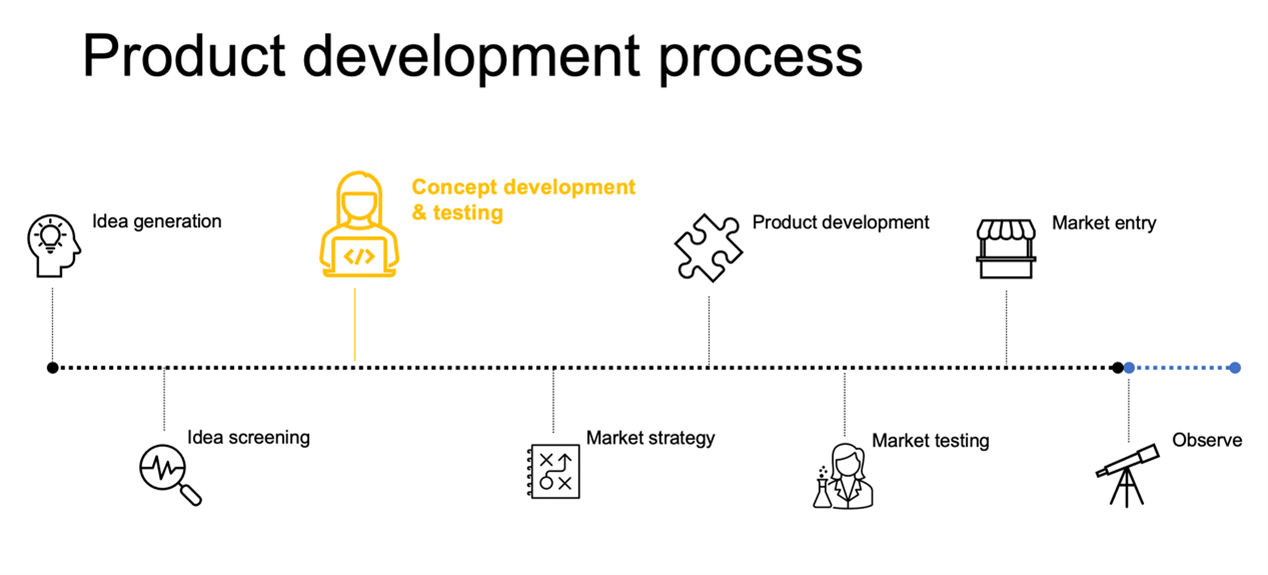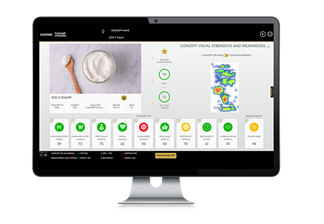Innovation is essential. It’s the key to growing a brand and meeting ever-evolving consumer needs. If you don’t innovate, you won’t succeed.
At the same time, innovation doesn’t guarantee success. In fact, most innovations fail – but that doesn’t mean you can’t manage the risk.
Concept testing is one aspect that can help. Let’s take a look at what concept development and testing involves, and some concept testing best practices to implement, in order to avoid falling into one of the many innovation failures that occur each year.
What is concept development & testing?
Before we assess why it’s important, we first need to understand the definition of concept testing and development. Put simply, it’s the process of developing concepts and innovations, and then testing their viability. This process helps to determine the success or failure of a product in the early stages and allows for troubleshooting of potential issues.
When to use concept testing?
Concept testing follows the idea generation and screening steps in product development, allowing you to introduce the target audience to the concept to see if it is worth pursuing.

Concept testing vs. usability testing: What's the difference?
Concept testing and usability testing are both vital in any product development, but the two shouldn’t be confused for each other. An easy way to think about the difference is to see concept testing as deciding which concept works best in theory, and usability testing as determining which concept works best in practice – which concept or product is easiest and most enjoyable to use as a consumer. Concept testing, UX testing and pack testing and all essential aspects of creating and selling a new product.
Why is it important for product development?
Why are processes such as concept development, concept testing and ux testing important? These actions allow you to:
Develop ideas with customer appeal
Testing validates target consumers’ perception of the product, something that is integral to product research and development. If a concept doesn’t appeal to consumers, they won’t be invested in the finished product.
Increase success rate of your innovations
It allows you to identify the strengths and weaknesses of different concepts so you can finetune the ones customers will want and, more importantly, buy.
Grow your brand
If the innovation concept is successful and consumers purchase the product, this allows you to grow portfolio sales and build your brand.
Save time and money
If concepts aren’t properly tested and whittled down, you are likely to end up with something that doesn’t satisfy consumer needs, doesn’t drive growth, and doesn’t deliver success. This means that you’ve wasted precious time and money creating something that has limited value for your brand.
Concept testing best practices
So, it’s pretty clear from the above that testing is a vital step in the innovation process, but you need to apply concept testing best practices to achieve the best results.
Set a goal
Concept testing is important, but the results can’t help you if you don’t know what it is you are hoping to achieve. Consider the purpose of the test and what you hope to learn. Setting a goal will help shape the test.
Choose the right methodology
Once you have your goals, you can now find a methodology works best for your brand and what you hope to achieve. Having a flexible testing framework in place gives you the most freedom to select what matters most for you.
Select the right audience
Testing a concept on an audience who will likely not be the target audience when marketing the product or service will provide useless results.
Ask the right questions
Rather than a simple ‘Which is better, A or B?’, delve deeper to uncover real insights into people’s preferences and decisions If people prefer A, find out why that is and what might be detracting them from B.
Identify the concept that will deliver
When you finish testing, you’ll be left with a lot of data that, when used correctly, can be extremely helpful in setting out your plans. Using a platform like Concept eValuate is a great way to help identify and optimize your highest potential innovation concepts with ease.
This automated concept testing platform turns around high-quality, cost-effective study results in as few as 24 hours. Compare your KPIs against market-level benchmarks using methods proven to improve innovation success rates, and explore and compare your results in an interactive dashboard.

Concept testing examples
Every year, brands test and measure new concepts, using the results to make important decisions about the trajectory of their innovations. Concept testing examples where the client has found success include:
- Danone used a concept testing platform to explore growth opportunities for Activia, discovering two concepts that outperformed benchmarks in just seven days.
- Beauty brand No7 used agile concept testing to inform product strategy, implementing a system that has allowed them to go to market with more confidence knowing that even their newest products will help position the brand to stand the test of time.
Having read through this article, you should know what concept development and testing is and the best practices to follow to make the process successful. Get in touch for more information and to see how Kantar can help your brand optimize its concept testing process.
